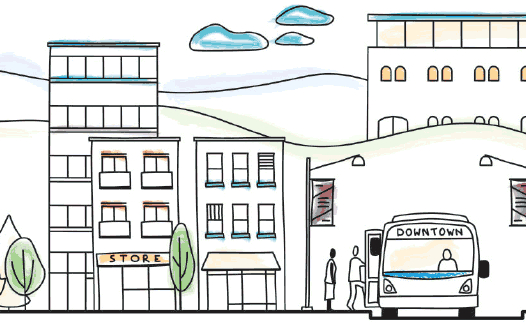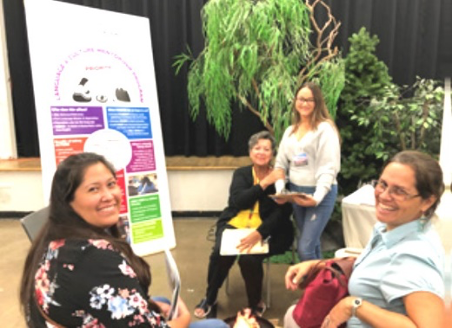The Intersectoral Fund
The Intersectoral Action Fund (ISAF) is a grants program by the Public Health Agency of Canada (PHAC), designed to bolster community capacity for intersectoral action on social determinants of health. The ISAF funds organizations addressing the societal, economic, legal, and political structures and norms that impact individuals and their behaviours. The program aims to enhance population health, reduce health inequities, and strengthen community resilience.
The 2022-23 ISAF funding cohort contained 13 projects. Each ISAF-funded project engaged diverse stakeholders – including community organizations, government agencies, local businesses, and individuals with lived experience – to collaboratively develop a common agenda and an action plan to address a pressing public health issue. This approach enabled the implementation of solutions for a range of complex health priorities while fostering long-term systemic change.
The Collective Impact (CI) Framework – a proven framework for multi-sector collaboration – served as the foundational model for 2022-23 ISAF funded projects. Each project required coordination across various sectors to tackle complex health challenges affecting health equity and well-being. The CI Framework’s five conditions – a common agenda, shared measurement, mutually reinforcing activities, continuous communication, and backbone infrastructure – facilitated the conditions for community action and implementation of meaningful intersectoral action.
Implementing innovative solutions demands creativity and courage. We commend funded projects for sharing their valuable experiences and insights for the benefit of all communities.
INTRODUCTION
In recent years, communities across Canada have been confronting systemic inequities that disproportionately affect immigrant and racialized populations. The City of Delta – a growing and diverse municipality in British Columbia – recognized that it also faced these challenges. As its demographics shifted, it became clear that traditional service delivery models were falling short for many marginalized residents.
This case study focuses on the Delta Collaborates: Building an Inclusive, Healthy & Just Community Project (Delta Collaborates) led by the City of Delta and funded by the Public Health Agency of Canada’s Intersectoral Action Fund. This project aimed to dismantle barriers and promote more equitable access to essential services, health resources, and community support to immigrant and racialized populations. Rather than building new systems from scratch, the project embraced a practical yet visionary approach: to embed equity, diversity, and inclusion into Delta’s existing community planning infrastructure. By integrating principles of equity into long-term municipal processes, Delta aimed to ensure that equity would permanently become a part of its decision-making and service delivery structure.
To achieve this, the City of Delta strengthened its organizational capacity in diversity and inclusion by onboarding a dedicated coordinator. Additional activities included meaningfully engaging existing community planning tables (CPTs) to enhance their capacity to improve the social determinants of health and wellbeing for immigrant and racialized community members in Delta and addressing the lasting impacts of the pandemic on these communities. In addition to engagement with CPTs, the project involved a series of community needs assessments and demographic analyses, which informed the development of informational materials, such as a Delta Newcomer Guide.
Importantly, the project supported strategic partnerships, municipal engagement, and sharing of project learnings with community stakeholders. Deliverables focused on coaching CPT members on systems-level social action, inclusive decision-making, and cultural sensitivity in the provision of services.
Insight #1 | Leveraging Existing Infrastructure for Systemic Change
The heart of the Delta Collaborates project was a bold and effective strategy: leverage existing community planning tables to advance equity. This approach enabled the project to move swiftly and efficiently to embed equity directly into the City of Delta’s established systems.
By integrating equity and diversity goals into established planning processes, the project ensured its impact would extend well beyond its formal timeline. Action teams within these tables tackled pressing issues such as supporting newcomers and addressing domestic violence, demonstrating how targeted efforts could be mobilized within existing frameworks and practices.
Insight #2 | Collaborative Learning Builds Community and Reduces Resistance to Change
Broader community resistance to change can cause challenges when aiming to confront systemic issues, such as racism or privilege. One of the key achievements of Delta Collaborates was its creation of a culture of collaborative learning. By fostering safe spaces where participants could make mistakes, ask tough questions, and engage with challenging issues, the project reduced resistance and created a more open and trusting environment for dialogue.
Our theory of change was simple but powerful: use what we already have in our community planning infrastructure to drive systemic change. The goal was to introduce an equity lens that would persist long after the project funding ended.
Olga Shcherbyna, Manager of Social Planning, City of Delta
This collaborative approach was essential in Delta, a community marked by diverse populations and historical inequalities. As participants became more comfortable confronting their own biases and assumptions, they were able to engage more deeply with the work of equity and inclusion, both within the project and their own organizations. By doing so, the project empowered individuals and organizations to become agents of change within their own spheres of influence. By centring collaborative learning, Delta Collaborates helped participants overcome barriers to change, allowing them to engage fully with equity work and ensuring that change was both deep and lasting.
Insight #3 | Responsive Support for Unique Community Needs
A defining feature of Delta Collaborates was its commitment to developing tailored resources to meet the specific needs of communities. The project team developed customized resources, including a newcomer's guide, brochures, and training materials, all of which were practical, accessible, and culturally relevant.
Community members were consulted in the design of these materials to ensure that they effectively addressed the real-world challenges that immigrants and racialized groups face when accessing services and reflected the diverse and intersectional socio-identities within the community. The involvement of grassroots organizations, public institutions, health authorities, and transition houses ensured that these resources were aligned with the specific needs and focus of different service providers as well, including those serving immigrant women facing domestic violence, seniors, and youth.
This emphasis on creating customized resources ensured that the content was understandable, informative, and responsive to the specific needs of Delta’s immigrant and racialized communities, increasing the impact and sustainability of the resources.
Additionally, by engaging directly with people affected by systemic inequities through outreach, a survey and community forum, Delta Collaborates fostered a sense of ownership and trust that traditional top-down approaches often fail to achieve. When communities feel genuinely heard, they are more likely to engage with and support the initiatives being developed. This co-creation model is a powerful reminder that community-driven solutions yield better results, as they are grounded in the real-world challenges and experiences of those most impacted by social inequities.
We realized that in order to change the system, we had to first change the way people feel about engaging with it. We created spaces where people felt safe to ask uncomfortable questions, make mistakes, and confront their own biases—only then could we tackle the root causes of inequity.
Olga Shcherbyna, Manager of Social Planning, City of Delta
Project Results and Impact
Recognizing that systemic change requires collective action, Delta Collaborates brought together more than 50 partners, including Fraser Health, the Delta School District, law enforcement, immigrant-serving agencies, and local non-profits. This multisectoral collaboration enabled the city to tackle complex, interconnected topics such as health access, domestic violence, youth engagement, and newcomer support. For instance, domestic violence prevention efforts were strengthened through collaboration between police and immigrant-serving agencies, while mental health support for youth was enhanced through partnerships between schools and healthcare providers. This coordinated approach ensured that no issue was addressed in isolation.
With over 50 partners involved, the project faced inevitable tensions and shifting priorities. Rather than rigidly adhering to a fixed plan, leaders embraced adaptability. Community feedback prompted shifts in focus—from general equity issues to more targeted efforts around domestic violence and mental health. This responsiveness ensured the project remained relevant and effective amid changing social and economic conditions. The project’s adaptability was a strength, not a compromise, highlighting that equity work must be dynamic & community-centred to succeed.
Additionally, the City of Delta also meaningfully engaged more than 800 residents, many from immigrant and racialized communities, through surveys and dialogues. These efforts validated lived experiences and empowered marginalized voices to influence the policies and services that shape their lives.
One of the most transformative outcomes was the establishment of Equity and Diversity Action Teams within the CPTs. These teams will serve as catalysts for ongoing dialogue, helping to dismantle systemic barriers and propose solutions that reflect the diverse realities of Delta’s residents.
A lot has been accomplished through this project, but the journey is far from over. To maintain momentum, several key recommendations are being considered moving forward, including:
-
Sustaining and supporting the Equity and Diversity Action Teams to keep equity at the forefront of planning
-
Continuing robust public engagement to ensure marginalized voices remain central to civic dialogue
-
Applying an equity lens to city services, and identifying and addressing disparities in access to public spaces, recreation, and transportation
-
Investing in ongoing capacity building for partners and stakeholders, including training in cultural competency, anti-racism, and trauma-informed practices
Conclusion
Delta Collaborates stands as a landmark initiative in the City of Delta’s ongoing journey toward becoming a more equitable and inclusive community. The project successfully leveraged existing infrastructure to embed equity into the city’s foundational planning processes. By transforming CPTs into spaces where inclusion and justice are central, Delta ensured that change would not only take root but evolve as part of an ongoing commitment to continuous improvement.
The success of Delta Collaborates underscores the power of cross-sectoral collaboration and community-led change. It offers a compelling model for municipalities across Canada and beyond. By centering equity-deserving voices, applying an intersectional lens, and fostering adaptability, Delta has shown that meaningful, systemic change is not only possible – it is sustainable.
In the years ahead, Delta Collaborates will be remembered not just for the tools it created or the systems it changed, but for how it fostered new relationships and reimagined the municipality’s approach to equity through empowerment, partnership, and an unwavering commitment to justice. Thanks to this initiative, Delta’s future is brighter, healthier, and more inclusive – and its lessons will resonate for generations to come.

Delta Collaborates would like to thank the leadership and staff from partner organizations as well as the many individuals whose input contributed to the success of this project. We would also like to acknowledge the Public Health Agency of Canada for the funding they provided to make this project possible.










%20(1).jpg)





